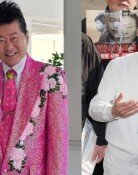Bulletproof glass appears on Lee’s campaign trail amid threats
Bulletproof glass appears on Lee’s campaign trail amid threats
Posted May. 20, 2025 07:33,
Updated May. 20, 2025 07:33
For the first time, bulletproof glass has appeared on the presidential campaign trail of Democratic Party candidate Lee Jae-myung. On Monday, at Yongsan Station in Seoul, Lee stood flanked by one large glass panel, one meter square, and two smaller panels placed at 45-degree angles on either side of the lectern. All three were nearly five centimeters thick.
The Democratic Party explained that the measures followed “reports that Russian-made sniper rifles have entered the country,” adding that the threat of political violence had grown. Lee, who had previously worn a stab-resistant vest, has been campaigning in full body armor since last week.
It is a somber reflection of the nation’s increasingly bitter divisions, where even the possibility of sniper attacks is no longer unthinkable.
Police have identified two individuals who posted death threats against Lee, and are also investigating a separate threat targeting Reform Party candidate, Lee Jun-seok. Authorities said the level of danger had escalated, prompting a three-tiered security operation. Special police units and detection dogs have been deployed to campaign sites, with anti-sniper teams stationed on nearby rooftops.
The threat of violence against presidential candidates can no longer be dismissed as hypothetical. In January, just three months before the general election, Lee was stabbed in the neck while campaigning in Busan. During the 2022 race, the Democratic Party leader at the time was struck in the head with a hammer while canvassing for votes.
Even the judiciary, once seen as removed from direct political confrontation, has come under attack following the declaration of martial law and the impeachment crisis. The Seoul Western District Court was recently stormed by protestors, and earlier this month, university students were arrested attempting to breach the Supreme Court after it ordered Lee’s case to be remanded.
A corrosive political culture has taken root, one in which differing views invite hostility. Politicians trade in inflammatory rhetoric and hate speech, while political YouTubers amplify these messages for profit. The most extreme supporters act out violently, and politicians then exploit the resulting outrage. It is a vicious cycle.
With just over two weeks remaining until the June 3 presidential election—and early voting set to begin in ten days—the police must remain vigilant. But so too must the political establishment and the voters. There must be a collective refusal to tolerate extremism and hate.
After six months of turmoil since martial law was declared, this snap election must serve as a turning point. The top priority for every candidate must be national stability and reconciliation, not further chaos.




![[천광암 칼럼]장동혁은 대체 왜 이럴까](https://dimg.donga.com/c/138/175/90/1/wps/NEWS/IMAGE/2026/02/22/133399127.1.jpg)


